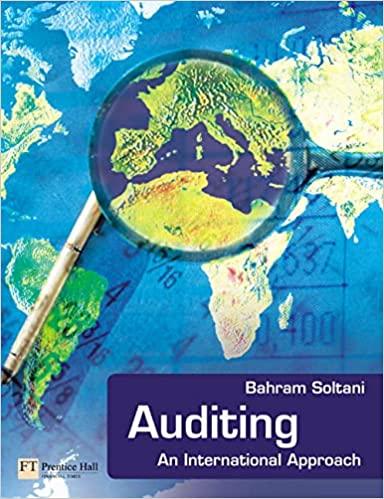Question
. Anderson Ltd. manufacture gearboxes for use in cars. At the start of the year, the management of Anderson Ltd. estimated that its costs would
. Anderson Ltd. manufacture gearboxes for use in cars. At the start of the
year, the management of Anderson Ltd. estimated that its costs would be:
This was based on the following:
| Direct labour Direct material Variable production overhead Fixed production overhead Administration overhead | 8 50 8 12 5 |
80 employees
2000 hours worked by each employee
40 000 gearboxes manufactured in the year as budgeted production
200 unit selling price.
You have recently been employed by the company to establish a standard
costing system. At the end of the year you were able to extract the
following information:
labour costs 4.40/hour
32 000 units sold
210/unit selling price
160 000 hours were worked
variable production overheads were 640 000
fixed production overheads were 810 000
administration costs were 350 000
raw material prices were 10% higher than expected
total expenditure on raw material was 3.696 M
there were no opening or closing stocks of raw materials.
(a) You are required to prepare an operating statement for the year, using
a standard absorption costing system.
Calculations should proceed according to the following headings
suffixing A for Adverse and F for Favourable where appropriate.
Resulting quantities required for the statement are then entered in the
Operating Statement for the Year sheet shown on page 6.
(All working must be shown.)
(Budgeted) Costs
Unit cost
Direct labour
Direct materials
Variable overhead
Fixed overhead
Admin. overhead
Total
Selling price
Standard profit (per unit)
Budgeted profit
Sales price variance
Sales quantity variance
Cost Variances
Labour Variances
Standard hours =
Standard cost/hour =
Rate variance =
Standard time =
Actual time =
Time variance =
Efficiency variance =
Material Variances
Material price =
Material usage standard =
actual =
Material usage variance =
Variable overheads
Standard cost =
Actual cost =
Expenditure variance =
Efficiency variance =
Fixed overheads
Expenditure variance =
Volume variance =
Admin overhead (treat as fixed)
Expenditure variance =
Volume variance =
Operating Statement for the Year
000 000
Budgeted Profit
Sales variance price
quantity
Cost variances
Labour rate
efficiency
Material price
usage
Variable expenditure
efficiency
Fixed expenditure
volume
Admin expenditure
volume
Actual Profit
(b) Give reasons/explanations why the variances in (a) above have
occurred for the following:
(i) material price
(ii) labour efficiency
(iii) fixed overhead expenditure.
(c) The accountant suggests that a standard marginal costing system may
be more suitable. He asks you to outline the strengths and
weaknesses of both systems and recommend the most suitable.
(d) The Board of Anderson Ltd. want to adopt ideal standards because
they feel it will encourage harder work. You are asked to produce a
brief report giving your views
Q A answer
The question has multiple parts having multiple subparts. I have answered the parts relating to labor and material variances.
____
Labor Variances:
Labor Cost Variances are calculated as follows:
| Formula | ||
| Standard Hours (80*2,000) | 160,000 | |
| Standard Cost/Hour | 200*8%*.25 = 4 | |
| Rate Variance | 64,000 (U) | Actual Hours*(Actual rate - Standard Rate) = 160,000*(4.40 - 4) |
| Standard Time | 128,000 (assumed for actual production) | |
| Actual Time | 160,000 | |
| Time Variance | 32,000 (U) | Actual Time - Standard Time |
| Efficiency Variance | 128,000 (U) | Standard Rate*(Actual Hours - Standard Hours for Actual Production) = 4*(160,000 - 32,000*160,000/40,000) or 32,000*4 |
____
Notes:
1) F indicates favorable variance and U indicates unfavorable variance.
____
Material Variances:
Material Cost Variances are calculated as follows:
| Formula | ||
| Material Price Variance | 336,000 (U) | Actual Material*(Actual Rate - Standard Rate) = 3,696,000/110*(110 - 100) |
| Material Usage Variance | 160,000 (U) | Standard Rate*(Actual Material - Standard Material for Actual Production) = 100*(33,600 - 32,000) |
____
Notes:
1) F indicates favorable variance and U indicates unfavorable variance.
2) Standard Material Rate = Selling Price*50% = 200*50% = 100
2) Standard material is assumed to be 1 per unit. Therefore, standard material used for actual production would be 32,0000 (32,000*1)
NOTE:i need Question B,C AND D answers.
Step by Step Solution
There are 3 Steps involved in it
Step: 1

Get Instant Access to Expert-Tailored Solutions
See step-by-step solutions with expert insights and AI powered tools for academic success
Step: 2

Step: 3

Ace Your Homework with AI
Get the answers you need in no time with our AI-driven, step-by-step assistance
Get Started


